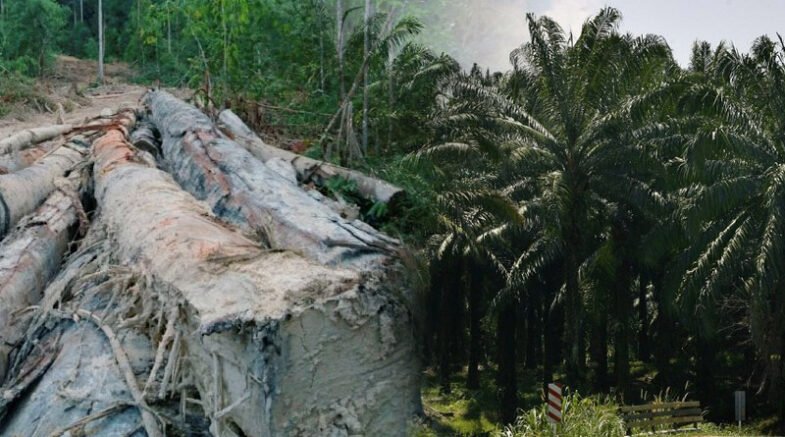Malaysian environmental watchdog group claims that areas of forest that are collectively 100 times the size of Kuala Lumpur have been designated for palm oil and timber plantations.

A Malaysian environmental watchdog group claims that areas of forest that are collectively 100 times the size of Kuala Lumpur have been designated for palm oil and timber plantations.
Climate organisation RimbaWatch said, its “landmark” deforestation prediction was based on an analysis of public documents like forestry maps, project descriptions, land activity, and real estate alerts in the study “State of the Malaysian Rainforest 2023.” Our analysis suggests that an additional 2,346,601 hectares of Malaysian forests have been set aside for deforestation, according to the study.
According to the study, the majority of deforestation projects between 2017 and 2021 were caused by timber plantations, which held a 41.6% market share, followed by palm oil plantations with a 15.5% market share.
Forestry authorities categorise timber and palm plantations as “forest plantations” and “forest covers,” respectively, according to the study.
These plantations actually involve deforestation because they “convert forest reserve lands into industrial monoculture plantations for commodities such as rubber and acacia.” Because it misleads the general public about the true nature of these projects, this practise is known as “greenwashing.”
The practise of growing only one kind of crop is known as monoculture farming. In addition to other negative effects, critics of this type of farming claim that it also destroys biodiversity, depletes water supplies, and depletes soil nutrients.
Malaysia’s Ministry of Natural Resources, Environment, and Climate Change reports that 55.52% of the nation’s land area was covered by forests in 2017. Forest cover in the Southeast Asian country will drop to 47.35% if the estimated 2.4 million hectares designated for deforestation are lost, according to RimbaWatch.
According to the study, Malaysia would then end up breaking its domestic and international climate commitment made at the 1992 Earth Summit, where it pledged to keep 50% of its land cover as forest.
Malaysia committed to halting deforestation by 2030 and reducing methane emissions at the United Nations Climate Change Conference in 2021. The nation also committed to becoming carbon neutral by 2050.
BenarNews contacted Malaysia’s minister of energy and natural resources, Nik Nazmi Nik Ahmad, to confirm RimbaWatch data on the amount of land designated for logging and learn more about Malaysia’s climate commitment regarding forest cover.
By email, the minister responded with a statement that neither confirmed nor denied the information from RimbaWatch. In a statement released on Wednesday, it was stated, “We appreciate efforts by civil society to raise awareness on the issue of forest loss.
We also point out that the results are estimates, so we are unable to comment on them until we have thoroughly examined and verified the study.
Ahmad Ismail, an environmentalist, said the government should be transparent and make sure environmental data is available. Such explanations don’t sit well with Ismail. He explained to BenarNews, “Because we want accurate data to refer to, so that there is no debate between the public, including NGOs.”
In order for the general public, particularly NGOs, to assist in protecting the areas, the government should also identify all protected areas and their borders. We can determine whether deforestation is legal or illegal thanks to new technologies like satellite images and drones.
The country, according to the environmental organisation Friends of the Earth Malaysia, lacks effective policies and laws that would incorporate the rights of indigenous and local communities in forestry management.
S. Mageswari, the organization’s honorary secretary stated that “a large majority of logging, monoculture plantations, and other destructive activities causing deforestation have been taking place in our indigenous customary territories for decades.”
According to her, monoculture plantation licences have been issued in these overlogged forests since the early 1990s, primarily for the cultivation of timber and oil palm trees.
“Over the last four decades, there has been a significant increase in deforestation due to this failure to manage forests sustainably and protect indigenous customary land rights,” she claimed.
